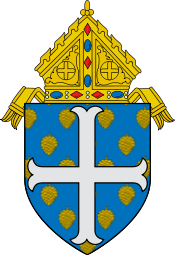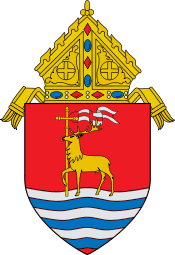John Gregory Murray
| The Most Reverend John Gregory Murray | |
|---|---|
| Archbishop of Saint Paul | |
| See | Saint Paul |
| Installed | January 27, 1932 |
| Term ended | October 10, 1956 |
| Predecessor | Austin Dowling |
| Successor | William O. Brady |
| Other posts |
Auxiliary Bishop of Hartford (1920-25) Bishop of Portland (1925-32) |
| Orders | |
| Ordination | April 14, 1900 |
| Consecration | April 28, 1920 |
| Personal details | |
| Born |
February 26, 1877 Waterbury, Connecticut |
| Died |
October 11, 1956 (aged 79) Saint Paul, Minnesota |
| Denomination | Roman Catholic Church |
John Gregory Murray (February 26, 1877 – October 11, 1956) was an American prelate of the Roman Catholic Church. He served as Archbishop of Saint Paul from 1931 until his death in 1956, having previously served as Auxiliary Bishop of Hartford (1920–25) and Bishop of Portland (1925-32).
Early life and education
John G. Murray was born in Waterbury, Connecticut, to William and Mary Ellen (née Connor) Murray.[1] His parents were both Irish immigrants; his father was from Carrickmacross, County Monaghan, and his mother was from Maryborough, County Leix.[2] One of his brothers, James, was a prominent lawyer in New York City.[3] He worked as a paperboy in his youth.[4] He received his early education at Waterbury Public Schools and graduated from high school in 1895.[2]
Murray attended Holy Cross College in Worcester, Massachusetts, where he graduated in 1897 with the highest honors ever bestowed upon a student until that time.[5] He continued his studies at the University of Louvain in Belgium.[6]
Priesthood
While in Louvain, Murray was ordained to the priesthood on April 14, 1900.[7] His first assignments, following his return to Connecticut, were as chaplain at Hartford County Jail and as professor of Greek and Latin at St. Thomas Preparatory Seminary.[2] He became chancellor of the Diocese of Hartford in 1903.[1]
Episcopacy
Hartford
On November 15, 1919, Murray was appointed auxiliary bishop of Hartford and titular bishop of Flavias by Pope Benedict XV.[7] He received his episcopal consecration on April 28, 1920 from Archbishop Giovanni Bonzano, with Bishops John Joseph Nilan and Thomas Joseph Shahan serving as co-consecrators.[7] He selected as his episcopal motto: Mea Omnia Tua (Latin: "My Everything is Yours").[8]
Murray was the first native of Connecticut to become a Catholic bishop, and the first auxiliary bishop of the Diocese of Hartford.[4] In addition to his episcopal duties, he was named pastor of St. Patrick's Church in Downtown Hartford in 1922.[2]
Portland
Following the death of Bishop Louis Sebastian Walsh, Murray was appointed the fifth Bishop of Portland, Maine, by Pope Pius XI on May 29, 1925.[7] His installation took place at the Cathedral of the Immaculate Conception on October 12 of that year.[7] During his five-year tenure in Portland, Murray established thirty new parishes and dedicated himself to Catholic education.[5] He also founded a diocesan weekly newspaper, Church World, in 1930.[5]
During the Great Depression, Murray organized relief committees to raise money for the homeless and unemployed families.[5] He was required to obtain loans and to mortgage church property to continue funding hospitals, orphanages, and other institutions.[5] Consequently, the diocese accumulated millions of dollars in debt.[5]
Saint Paul
Murray was appointed the third Archbishop of Saint Paul, Minnesota, on October 29, 1931.[7] He was installed at the Cathedral of Saint Paul on January 27, 1932.[7] To address the continuing effects of the Great Depression, Murray began a crusade of charity to support the poor and unemployed, and made himself available to the public by taking public transit and walking in the downtown areas.[9]
During his 24-year tenure, Murray established over 50 new parishes, eliminated debt at the College of St. Thomas, and constructed a science hall, gymnasium, and a new seminary library.[9] He also began a radio show on WCCO called "Church of the Air," established the Confraternity of Christian Doctrine, the Family Guild, and mandated liturgical reform in the archdiocese.[9] In 1941, the national Eucharistic Congress was held at Saint Paul, an event which many considered a testament to Murray's influence.[9] In 1949, he ordered Catholic parents to not allow their children to receive sex education in public or private schools.[6] He also served as a member of the administrative board of the National Catholic Welfare Council.[6]
Murray died of cancer at age 79, and is interred at Resurrection Cemetery.[9]
References
- 1 2 Curtis, Georgina Pell (1961). The American Catholic Who's Who. XIV. Grosse Pointe, Michigan: Walter Romig.
- 1 2 3 4 Athans, Mary Christine (2002). "To Work for the Whole People": John Ireland's Seminary in St. Paul. Mahwah: Paulist Press.
- ↑ "Another Life". TIME Magazine. 1954-09-06.
- 1 2 "Pigeons at St. Paul". TIME Magazine. 1932-02-08.
- 1 2 3 4 5 6 "Most Rev. John G. Murray, D.D.". Roman Catholic Diocese of Portland.
- 1 2 3 "JOHN MURRAY, 79, ARCHBISHOP, DEAD". The New York Times. 1956-10-12.
- 1 2 3 4 5 6 7 "Archbishop John Gregory Murray". Catholic-Hierarchy.org.
- ↑ "Former Auxiliary Bishops". Roman Catholic Archdiocese of Hartford.
- 1 2 3 4 5 "Most Reverend John G. Murray". Roman Catholic Archdiocese of Saint Paul and Minneapolis.
External links
Episcopal succession
| Catholic Church titles | ||
|---|---|---|
| Preceded by Austin Dowling |
Archbishop of Saint Paul 1931–1956 |
Succeeded by William O. Brady |
| Preceded by Louis Sebastian Walsh |
Bishop of Portland 1925–1931 |
Succeeded by Joseph Edward McCarthy |
| Preceded by Joseph Francis Donnelly |
Auxiliary Bishop of Hartford 1920–1925 |
Succeeded by Paul S. Loverde |


